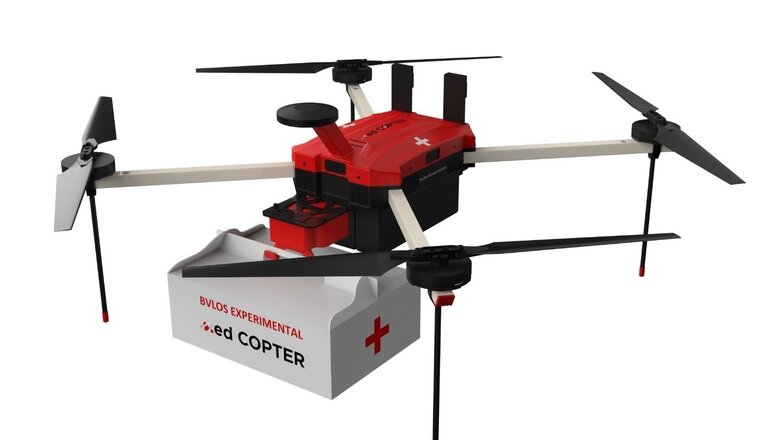
views
Drones carry two very distinct streams of perception. One is of being a rich kid’s toy or the indulgence of those with means who can get their shopping and pizzas delivered by unmanned flying vehicles. The other is one of opening doors to the sort of utility and reach that otherwise wouldn’t be possible by roads or waterways, for instance. If we are to emerge from the narrow definitions that drones seem to be wrapped in, there are two sides of the coin that indicate these as the trump card in a variety of domains. From critical and precise intervention for agriculture over large areas, to delivering medicines in far reaches of the geographical boundaries to delivering goods with zero human interaction. Versatility of drones is something India’s Drone Rules 2021 acknowledge and try to make things easier to build up their use in India.
The Ministry Of Civil Aviation of the Government of India has officially notified the rules, following up from the draft policy released earlier this summer. The new rules define ownership for private and commercial drones in India, drone usage and approvals, weight classifications, registration of existing drones, zonal restrictions and airspace maps, remote pilot licenses as well as training organization as well as a push for Made in India technologies, designs, components, and unmanned aircraft systems as well as Indian regional navigation satellite systems. These rules are taking cognizance of the fact that it has to be made easier for drone usage to be deployed, particularly for business and community usage, and also India’s role and importance in the global drone economy.
“We expect that almost all sectors of the economy like ? agriculture, mining, infrastructure, surveillance, emergency response, transportation, geo-spatial mapping, defense, and law enforcement shall gain tremendously from these rules,” says Abhay Karandikar, Director at IIT Kanpur. “A welcome move to push the Indian Drone Industry towards new heights,” says the Drone Federation of India in a statement shared on social media.
The numbers tell their own story. The Indian UAV drones market is expected to be as large as $1.8 billion by the year 2026, with an annual growth of 14.61%, that’s according to numbers released this summer by research firm ResearchAndMarkets. Earlier this month, a successful Beyond Visual Line of Sight (BVLOS) trial run for drone delivery of medicines in Bengaluru was piloted by the Throttle Aerospace Systems (TAS) and UDAN (Ude Desh ka Aam Naagrik). The ministry of Civil Aviation of the Government of India confirmed that this trial run was completed in the 15km radius at Gauribidanur, in the outskirts of Bengaluru.
The drones used for this trial were Medcopter X4 and Medcopter X8. These are developed by Indian drone company Throttle Aerospace Systems, which is Bengaluru based. The stats—an average of 3.5km distance was covered in up to 7 minutes of flying time. Two different payloads were tested as well, up to a maximum of 2kg. The Medcopter X4 weighs around 3.5kg and can hold payloads of up to 1kg while the Medcopter X8 weighs around 5.5kg and can hold payloads up to 2kg. According to the new rules, both these drones would be classified as Small unmanned aircraft system.
“Today, some of the most exciting potential applications come from the use of drones in the healthcare and medical deliveries. Drones are effectively delivering biologicals like blood, serums, viral culture, vaccines and organs in the fastest and safest manner which is helping in saving millions of lives,” Wing Commander S Vijay (Veteran), had told News18, in an interaction earlier. “It is high time we think of a future where packages would reach in minutes instead of hours or days,” he had added. A research report led by John Hopkins Bloomberg School of Public Health indicated that drones in the medical field have the possibility of improving vaccination rates and aid in various immunization programs held globally.
Read all the Latest News, Breaking News and Assembly Elections Live Updates here.




















Comments
0 comment